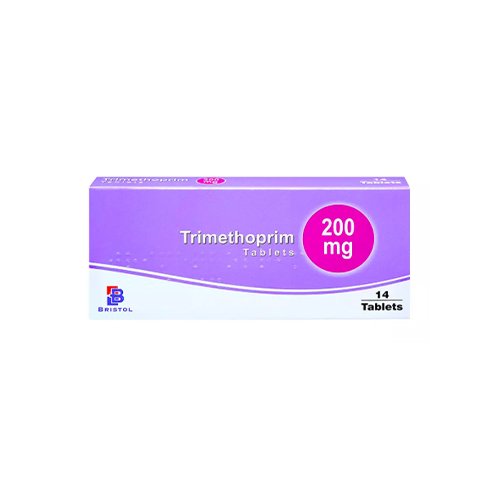- Treats UTI
- Short Course and Long Course Treatments
- Twice daily dosage / Three day course/ Seven day course
Trimethoprim
Trimethoprim is an antibiotic. It is used to prevent and treat infections of the bladder, kidney and other parts of the urinary tract.
What is Trimethoprim?
Trimethoprim tablets belong to a group of medicines known as antibacterials. They are used to kill a wide range of bacteria that cause infections in your body:
- Primarily acute urinary and respiratory tract infections.
- Recurrent urinary tract infections.
How to take Trimethoprim
Always take this medicine exactly as your doctor or pharmacist has told you. They can be swallowed with a glass of water, but not chewed, at the same time each day.
How to take Trimethoprim tablets
Dosage
Adults
Severe or sudden infections: usually your doctor will prescribe 200mg taken twice daily. Always take this medicine exactly as your doctor or pharmacist has told you. Check with your doctor or pharmacist if you are not sure. They can be swallowed with a glass of water, but not chewed, at the same time each day.
Never change the dose of your medicine without talking to your doctor first.
If you forget to take your medicine
If you do forget to take a dose of your medicine at the correct time, take it as soon as you remember, then take the next dose at the right time. DO NOT take a double dose.
If you stop taking your medicine
Keep taking this medicine until your doctor tells you to stop. Do not stop taking it just because you feel better. If you stop taking this medicine, your condition may re-occur or get worse. If you experience symptoms of stopping treatment, contact your doctor.
If you take more of your medicine than you should
If you take too many tablets, tell a doctor or pharmacist or go to the nearest hospital casualty department straight away. Remember to take this leaflet and the tablet packaging with you.
Trimethoprim Side effects & precautions
Talk to your doctor or pharmacist before taking Trimethoprim Tablets if you:
- are pregnant
- suffer from kidney problems/kidney disease or are having dialysis treatment.
- have a deficiency (are low) in folic acid (may cause anaemia)
- are at greater risk of high levels of potassium in your blood (hyperkalaemia), e.g. the elderly or those on higher doses
- are also taking repaglinide (medicine for treating diabetes)
- suffer from porphyria (a disorder that causes skin sensitivity to light, pain attacks and muscle weakness)
- Trimethoprim should not be given to premature babies or babies during the first few weeks of life.
Trimethoprim can increase potassium blood levels. Patients at risk of increased potassium blood levels include those with kidney problems, poorly controlled diabetes, or those on certain medicines or potassium supplements. The symptoms of severe hyperkalaemia might include muscle cramps, irregular heart rhythm, diarrhoea, nausea, dizziness or headache.
Other medicines and Trimethoprim
Please inform your doctor or pharmacist if you are taking, or have recently taken any other medicines, even those not prescribed. Your medicine may interfere with other medicines that you are taking:
- procainamide, to treat abnormal heart rhythm
- repaglinide, used to treat diabetes
- digoxin, to treat certain heart conditions
- potassium supplements
- medicines known as ACE inhibitors and angiotensin II antagonists (used to treat high blood pressure and certain heart conditions).
- heparin (used to treat and prevent blood clots)
- diuretics (water tablets such as furosemide, eplerenone, spironolactone, amiloride or triamterene)
- rifampicin (antibiotic), used to treat TB
- anticoagulants (to prevent clots from forming in the blood e.g. warfarin)
- phenytoin, to treat epilepsy
- pyrimethamine and dapsone, used to treat malaria
- immunosuppressant drugs – used in cancer treatment (e.g. methotrexate) or to treat organ rejection after transplant (e.g. azathioprine or ciclosporin)
- bone marrow depressants
- spironolactone
Driving and using machines
There is no evidence to suggest that Trimethoprim Tablets affect the ability to drive or operate machinery
Pregnancy and breast-feeding
DO NOT take Trimethoprim Tablets if you are pregnant. If you are breastfeeding, ask your doctor or pharmacist for advice before taking this medicine.
Important information about some of the ingredients of Trimethoprim Tablets
These tablets contain a sugar called lactose. If your doctor has told you that you have an intolerance to some sugars, contact your doctor before taking this medicinal product
Side effects
Like all medicines, Trimethoprim Tablets can cause side effects, although not everybody gets them.
Rare serious allergic reactions have occurred known as anaphylactic or anaphylactoid reactions.
STOP taking Trimethoprim Tablets and contact your doctor or go to your nearest hospital casualty department IMMEDIATELY if you notice any of the following symptoms:
Difficulty breathing
- swelling of the face, lips, tongue and throat
- chest pain
- shock, fainting or collapse
Common side effects
- headache
- skin rashes
- hives
- thrush
- nausea, diarrhoea, vomiting
Reporting of side effects
If you get any side effects talk to your doctor or pharmacist. This includes any possible side effects listed on the attached leaflet. You can also report side effects directly via the internet at www.mhra.gov.uk/yellowcard. By reporting side effects, you can help provide more information on the safety of this medicine.
Trimethoprim Tablet Ingredients and storage
Some of the ingredients of Trimethoprim Tablets
These tablets contain a sugar called lactose. If your doctor has told you that you have an intolerance to some sugars, contact your doctor before taking this medicinal product
How to store Trimethoprim tablets
Keep these medicines out of the sight and reach of children. Store below 25°C in a dry place. Do not use Trimethoprim tablets after the expiry date stated on the label/carton/bottle. The expiry date refers to the last day of that month. Medicines should not be disposed of via wastewater or household waste. Ask your pharmacist how to dispose of medicines no longer required. These measures will help to protect the environment.
Contents of the pack and other information
What Trimethoprim tablets contain
- The active substance (the ingredient that makes the tablets work) is trimethoprim. Each tablet contains either 100mg or 200mg of the active substance.
- The other ingredients are colloidal silicon dioxide, lactose, macrogol, magnesium stearate, povidone, sodium starch glycollate, stearic acid, microcrystalline cellulose (E460).
What Trimethoprim tablets look like and the contents of the pack
Trimethoprim tablets are white, circular, uncoated tablets.
Documentation
Trimethoprim Patient Information Leaflet (PIL)



We’re here to help.
Our friendly team is available to help Monday to Friday 9:00am - 5:00pm.
If you need urgent assistance, do not use this service. Call 111, or in an emergency call 999.

